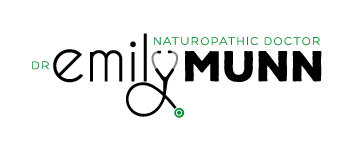PCOS 101
Polycystic ovarian syndrome or PCOS is the most prevalent endocrine disorder affecting millions of women in North America. It is a complex condition as we still don't know its exact cause. Some factors that may be at play are insulin resistance in all tissues but pituitary and ovaries, chronic low grade inflammation, fatty tissue dysfunction (lipotoxicity), gut microbiome dysbiosis, and heredity (1,13). Because of its involvement with multiple body systems, symptoms vary. For this reason, it may go undetected by some doctors for years. Despite not knowing a precise cause, certain signs and symptoms can lead to a PCOS diagnosis. Classic PCOS comes with a set of symptoms such as irregular or absent periods, evidence of high androgens (excess hair growth, moderate to severe acne, thinning hair), being overweight or obese, and multiple small ovarian cysts - hence the name "polycystic" meaning many cysts or fluid-filled sacs. To be diagnosed with classic PCOS, you will have at least 2 of these signs or symptoms.
We now know there are subtypes of PCOS that are different than "classic" PCOS. Women with atypical PCOS can look very different. She may be lean and may or may not have significant insulin resistance. Some women get their periods regularly (this doesn’t guarantee ovulation is occurring), others have only mild acne and normal blood androgen levels. Multiple ovarian cysts may not be present either.
Because PCOS can be a confusing condition with multiple factors at play, it is best to seek advice from a health care practitioner who focuses in women's health for a proper diagnosis and adequate treatment. Your family doctor may not be enough.
Signs & Symptoms of PCOS
Irregular or absent periods
Lack of ovulation or anovulatory cycles
Infertility
Overweight or obesity
Difficulty losing weight
Pelvic pain
Lower libido
Sleep apnea
Excess hair growth (ie. chin, chest, stomach, upper lip, backs of arms, sides of thighs)
Acne
Thinning hair
Darkened patches of skin
Depression
Anxiety
Blood sugar problems (ie. high fasting blood glucose)
Insulin resistance
Hormone imbalance (ie. low progesterone)
High androgens (ie. testosterone, DHEA-S, androstenedione)
High LH to FSH ratio
Elevated inflammatory markers (some cases)
Elevated anti-mullerian hormone (especially for age)
High stress and adrenal dysfunction
Ovarian cysts
Thyroid dysfunction
Why is PCOS important to know about and treat?
Some women with PCOS have a harder time getting pregnancy. Miscarriage rates are also slightly higher in a woman with PCOS if there is poor egg quality and low progesterone levels. Working with a naturopathic doctor can improve your egg health, optimize your fertility, and help to maintain a healthy full term pregnancy. Some medicines I use often in my practice when treating PCOS include inositol powder, black cohosh, white peony root, licorice root, ubiquinol (CoQ10), Vitex or chaste berry tree, n-acetyl-cysteine (NAC), berberine, phosphatidlyserine, adrenal support, plant based anti-androgens, vitamin D3, acupuncture, and bio-identical progesterone (2-13). When a holistic approach is taken, PCOS symptoms can drastically be reduced, if not totally eliminated.
PCOS is also important to know about and treat because women with untreated PCOS have a higher risk for developing cardiovascular disease, diabetes, endometrial cancer, gestational diabetes, sleep apnea and liver disease (14). Despite the negativity, all types of PCOS are very treatable especially when a naturopathic approach is used.
References:
http://www.mayoclinic.org/diseases-conditions/pcos/basics/causes/con-20028841
Inositol:http://www.ncbi.nlm.nih.gov/pubmed/25054962
Black cohosh: http://www.ncbi.nlm.nih.gov/pubmed/23347605 -
Herbal medicine: http://www.ncbi.nlm.nih.gov/pubmed/25524718
CoQ10: http://www.ncbi.nlm.nih.gov/pubmed/24813752
Nutritional supplements: http://www.ncbi.nlm.nih.gov/pubmed/17211965
NAC vs metformin: http://www.ncbi.nlm.nih.gov/pubmed/21831508
Berberine vs metformin: http://www.ncbi.nlm.nih.gov/pubmed/23869585
Plant anti-androgens: http://www.ncbi.nlm.nih.gov/pubmed/23843810
Li HWR, Brereton RE, Anderson RA, Wallace AM & Ho CKM. Vitamin D deficiency is common and associated with metabolic risk factors in patients with polycystic ovary syndrome. Metabolism 2011;60:1475-81
Acupuncture and IVF: http://www.ncbi.nlm.nih.gov/pubmed/25951635
Healthy weight and progesterone levels: http://www.ncbi.nlm.nih.gov/pubmed/26751901
McCulloch, Fiona, ND, RA. Ovulatory Dysfunction Lecture. IF Symposium. Vancouver, BC. 2016
http://www.pcosfoundation.org/pcos-risks

